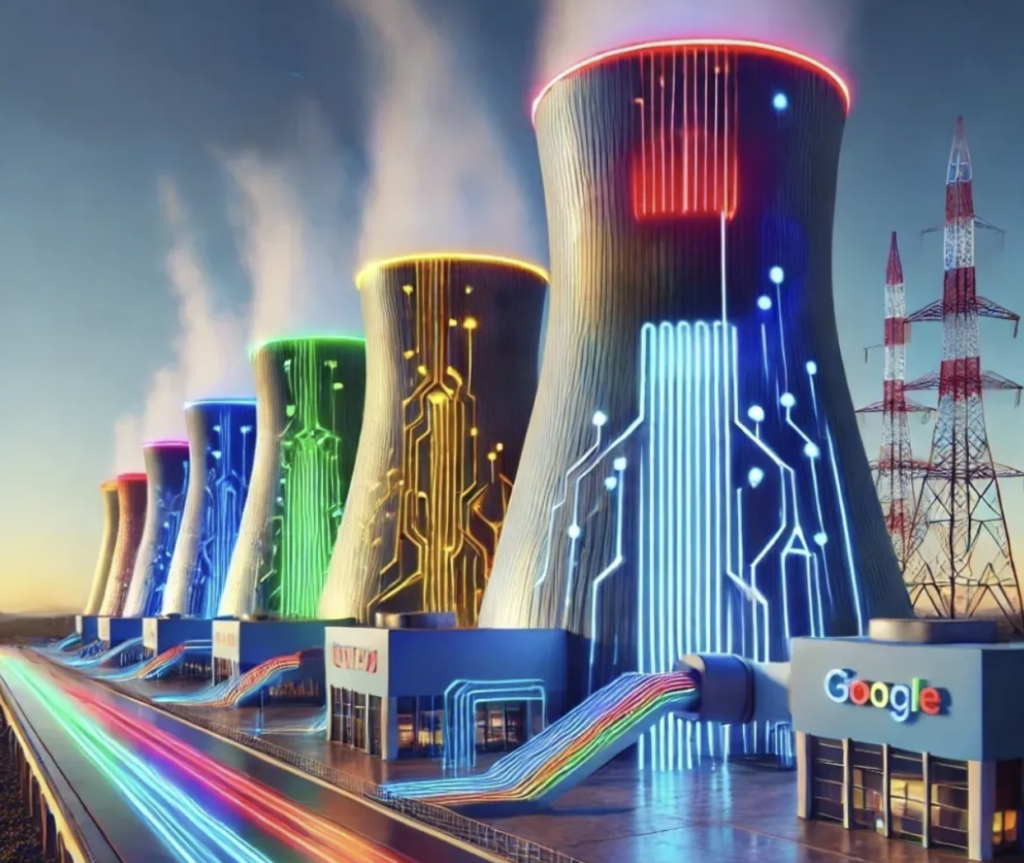Big Tech is about to become Big Energy

Listen to a discussion on this article. Cool thing this is an entirely AI generated podcast !
Big Tech = Big Energy
If you thought Big Tech had too much power before, brace yourself — they’re about to plug into even more, both figuratively and literally. The companies that control the internet and emerging AI are now positioning themselves to become energy overlords as well. Alphabet, Microsoft, and Amazon have announced moves into the energy space, and they’re going nuclear!
Thermonuclear AI
Google has announced a groundbreaking energy deal to power its AI operations using mini nuclear reactors, partnering with Kairos Power. By 2035, Google plans to build up to seven compact nuclear reactors, with the first going live as soon as 2030. This move aims to meet the increasing power demands of AI while maintaining carbon-free energy around the clock. Microsoft and Amazon are also exploring nuclear energy to support their AI needs, with Microsoft’s deal reviving the dormant Three Mile Island nuclear plant.
Information as Energy
Albert Einstein’s theory redefined the 20th century by showing us that mass is simply another form of energy. Fast forward to the present day, and theoretical physics proposes something even more fundamental: mass and energy are not separate entities, but forms of information.
This revelation points to the defining characteristic of the 21st century—information as the most powerful form of energy, realized through computing power, or “compute.” The businesses that control this new energy—compute (Big Tech)—are poised to further ensconce their position as the most dominant in history.
The Power Shift
Historically, energy has been the foundation of economies. Big Oil ruled the stock markets for most of the 20th century. But today, Big Tech has taken over. In 1980, 6 of the 10 largest companies in the world were in oil. Today, 7 of the 10 largest firms are tech companies. Only one energy firm remains on the top ten list.
It’s not just a passing of the torch from one sector to another, though. There’s a deeper connection at play: as tech companies increasingly invest in energy-intensive data centers to power AI, the line between energy and tech is blurring. Training just one of today’s advanced AI models requires energy equivalent to powering a small country. Data centers already consume around 5% of the U.S.’s total power supply, a number expected to triple by 2030.
AI is accelerating this transformation, shifting Big Tech from information, data, and attention to literally providing energy.
Monopoly 2.0
It’s a super smart play from Big Tech for a few reasons. Firstly, energy is a major cost in their business; secondly, incredible amounts of it are needed to power AI; and thirdly, it gives them a new market to enter by stealth—retailing energy.
With a number of antitrust cases against Big Tech, they have to be careful where and how they grow. Acquiring nascent competitors in AI and software would bring unwanted scrutiny from regulators. A better path is to solve their own energy problem, generate much more than they need, and sell the excess to you and me. Amazon did this with AWS – bought much more than they needed, took a cost, turned it into their biggest profit centre.
They already have direct relationships with every consumer on the internet. And of course, they’ll offer it cheaper than your local electricity supplier and provide themselves the zero-emissions tick.
The best part for Big Tech firms is they get the chance to grow while defeating those evil energy companies like Shell and Exxon. All the while being seen as providing ‘competition’ in the energy sector—the white knight with a nuclear edge.
First information, then AI, then energy… and next… transport, banking, insurance?
Big Tech is more powerful than nation-states—they are the new global colonizers.
Total Power
We once thought of Big Tech as the saviours compared to old media and the oil barons of the past. But today, we know that every industry, from fossil fuels to social media, comes with externalities—unintended negative consequences. Energy consumption has given us climate change. The attention economy has fueled misinformation and societal division.
This new energy age isn’t just about faster processors and better AI—it’s about harnessing all forms of ‘power.’ And just like the oil barons of the past, today’s tech giants will shape the future with staggering amounts of capital, vast control over AI, and almost anything that gets in its path.
Keep Thinking,
Steve.